
- Vortex
- Atlantium
- Beyond The Mountain
- Children Of The Gods
- A Dream Of Conquest
- An Act Of Love
- Funhouse
- Turnabout
- Riddles
- The Innocent Prey
In the 1970s, the mysticism and alternative spirituality of the 1960s, combined with the cynicism of a country that had gone through the excesses of the Vietnam War and the revelations of Watergate, resulted in a cultural sea change in the United States. Popular fiction produced conspiratorial tales that made pre-’70s conspiracy fiction like The Manchurian Candidate seem almost tame and simplistic. We now knew to what length certain rogue actors within our own government would go to cover up the truth. The evil that men do was no longer just the evil that other men do.
Science fiction in the early ’70s was bleak as a result, reflecting the disenchantment that the viewing audience was dealing with. From the TV incarnation of Planet Of The Apes to the slightly watered-down children’s series Ark II, the starting point of much TV SF was that the world would be destroyed; no one’s best intentions would be able to stop it. The ’60s optimism that had sparked Star Trek was gone. Along with the rising tide of belief in wide-ranging conspiracies came a marked increase in interest in the paranormal and unexplained phenomena: even nature itself was conspiring against us. This was the era of Bigfoot and Loch Ness Monster sightings, theories about the lost continent of Atlantis and the Bermuda Triangle, and even the end of the world itself (a near-obsession sparked by the publication of the book “The Late Great Planet Earth”, in which – for what would be far from the last time – the book of Revelations was picked over and analyzed to “prove” the author’s theory that the Biblical end times were upon us).
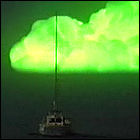 It was in this environment that Bruce Lansbury Productions initiated production on a movie-of-the-week pilot for what it hoped would be a new series, The Fantastic Island. The Fantastic Island would follow a group of modern-day adventurers in their quest to survive and escape the perils of an unknown island in the Bermuda Triangle – with hints that the island might be Atlantis, or somehow related to Atlantis. A father-and-son duo led the team, which would start out as a surprisingly large ensemble cast prior to being whittled down to a more manageable number by the island’s many dangers. A man from the future, also stranded on the island, would befriend the explorers and help guide them, but being from a pacifistic future (perhaps a hint that Star Trek’s optimism wasn’t regarded as completely passe), he would not fight for them except in defense; any adversaries met along the way would have to be dealt with by means of present-day wits or present-day fists, whichever the writers thought was more exciting during a given week.
It was in this environment that Bruce Lansbury Productions initiated production on a movie-of-the-week pilot for what it hoped would be a new series, The Fantastic Island. The Fantastic Island would follow a group of modern-day adventurers in their quest to survive and escape the perils of an unknown island in the Bermuda Triangle – with hints that the island might be Atlantis, or somehow related to Atlantis. A father-and-son duo led the team, which would start out as a surprisingly large ensemble cast prior to being whittled down to a more manageable number by the island’s many dangers. A man from the future, also stranded on the island, would befriend the explorers and help guide them, but being from a pacifistic future (perhaps a hint that Star Trek’s optimism wasn’t regarded as completely passe), he would not fight for them except in defense; any adversaries met along the way would have to be dealt with by means of present-day wits or present-day fists, whichever the writers thought was more exciting during a given week.
But The Fantastic Island, which underwent a title change to The Fantastic Journey along the way, had a journey ahead of it that was 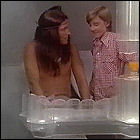 every bit as troubled as the quest it depicted.
every bit as troubled as the quest it depicted.
NBC executives’ notes to the show’s producers were not kind. If The Fantastic Journey had any chance of being picked up as a series, major changes to the format would be required, not the least of which was the elimination of several characters, including the show’s father figure. The man from the future, played by Jared Martin (later to star in the late 1980s TV version of The War Of The Worlds), was an exciting and mysterious character, but most of the explorers would be exploring no further. The writers, with story editor and Star Trek veteran D.C. Fontana, regrouped to try to meet the network in the middle with its proposed changes.
Perhaps the most eyebrow-raising of these changes was that young Scott Jordan, played by Ike Eisenmann (who had also starred in Escape From Witch Mountain and would later gain another footnote in genre history by appearing as Scotty’s 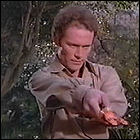 doomed nephew in Star Trek II: The Wrath Of Khan), would stay on the show, while his father would be one of the characters jettisoned at NBC’s behest. Despite an explanation that hinted strongly that Scott’s father was not given the option of taking his son home with him, added to the pilot in hastily-scripted scenes filmed at the beginning of production of the weekly series, this notion strained the show’s credulity as much as any mention of men from the future or the Bermuda Triangle. The only other characters retained from the pilot movie were Martin’s character, Varian,and Dr. Fred Walters, played by African-American actor Carl Franklin.
doomed nephew in Star Trek II: The Wrath Of Khan), would stay on the show, while his father would be one of the characters jettisoned at NBC’s behest. Despite an explanation that hinted strongly that Scott’s father was not given the option of taking his son home with him, added to the pilot in hastily-scripted scenes filmed at the beginning of production of the weekly series, this notion strained the show’s credulity as much as any mention of men from the future or the Bermuda Triangle. The only other characters retained from the pilot movie were Martin’s character, Varian,and Dr. Fred Walters, played by African-American actor Carl Franklin.
Added to the show’s format in the first post-pilot episode would by Liana, played by Katie Saylor, an all-purpose woman of mystery and vaguely-defined abilities that verged on superpowers, including a telepathic bond with a cat who could act as her eyes and ears. The following episode would introduce yet another character, one which the writers constructed with actor Roddy McDowall in mind, in the hopes that he’d commit to appearing in the series every week. Bearing a vague resemblance to Lost In Space’s Dr. Smith, McDowall’s character was an eccentric, amoral scientist named Willaway who was 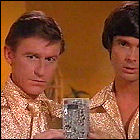 as likely to act in the group’s interests as he was to act in his own. Impressed with the character’s ambiguity, McDowall signed on for his first regular series TV role since Planet Of The Apes.
as likely to act in the group’s interests as he was to act in his own. Impressed with the character’s ambiguity, McDowall signed on for his first regular series TV role since Planet Of The Apes.
The production was almost immediately beset by problems. The turnaround between NBC’s acceptance of the altered pilot and the show’s first airing was mere weeks, meaning that production had to be ramped up, and new scripts written, on extremely short notice. Mere weeks into the show’s run, there was little indication that a significant audience had latched onto the adventures of Varian and friends; the show was removed from the schedule for a month and then returned intermittently. Katie Saylor was reportedly too ill to appear in the last story shot before the series was cancelled. The 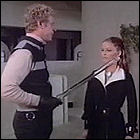 final episode produced, The Innocent Prey, was quietly aired in June 1977 – by which time Star Wars had premiered and completely changed the audience’s expectations of speculative fiction.
final episode produced, The Innocent Prey, was quietly aired in June 1977 – by which time Star Wars had premiered and completely changed the audience’s expectations of speculative fiction.
Much of the writing and production staff from The Fantastic Journey immediately moved on to a new TV project, a television adaptation of the 1976 movie Logan’s Run, which would premiere in late 1977 on CBS, featuring another band of adventurers roaming through the post-apocalyptic wilds of southern California.
NBC, however, wasn’t done visiting Atlantis: in March 1977, while The Fantastic Journey was on its first hiatus, another TV movie premiered starring TV’s Patrick Duffy as the titular Man From Atlantis. The success of these four movies made a weekly series almost inevitable, though the series really just overlaid the Atlantis mythology onto Duffy’s character in what was otherwise a fairly typical globe-trotting adventure story with some spy trappings. The weekly series of Man From Atlantis premiered in the fall of 1977, after The Fantastic Journey had become little more than a memory.
The cast and crew of The Fantastic Journey moved on to other projects, with Ike Eisenmann eventually giving up acting to work in sound editing, though he still does voice work in projects such as the English dub of Hayao Miyazaki’s Howl’s Moving Castle. Carl Franklin became a respected director, with such movies as Devil In A Blue Dress, Nowhere To Run, One True Thing and episodes of series such as Rome and The Riches under his belt. Rumors of Katie Saylor’s death persisted for years, until it turned out that she had simply left show business. Jared Martin went on to a recurring role in Dallas and eventually starred in another sci-fi series, War Of The Worlds, before devoting most of his time to nonprofits promoting the arts in his adopted home town of Philadelphia until his death in 2017.
The Fantastic Journey was hard to catch in reruns unless it was picked up by a specialty cable channel, and it wasn’t until 2019 that it finally received a DVD release – a PAL-encoded region 4 (Australian) DVD release no less! – from Via Vision to satisfy its small cult following. The set boasts the pilot movie, the nine episodes that followed, zero bonus features, and no attempt to restore or clean up the original film prints was made prior to publication – it’s the very definition of a no-frills release of a show that became as difficult to find as Atlantis itself.

